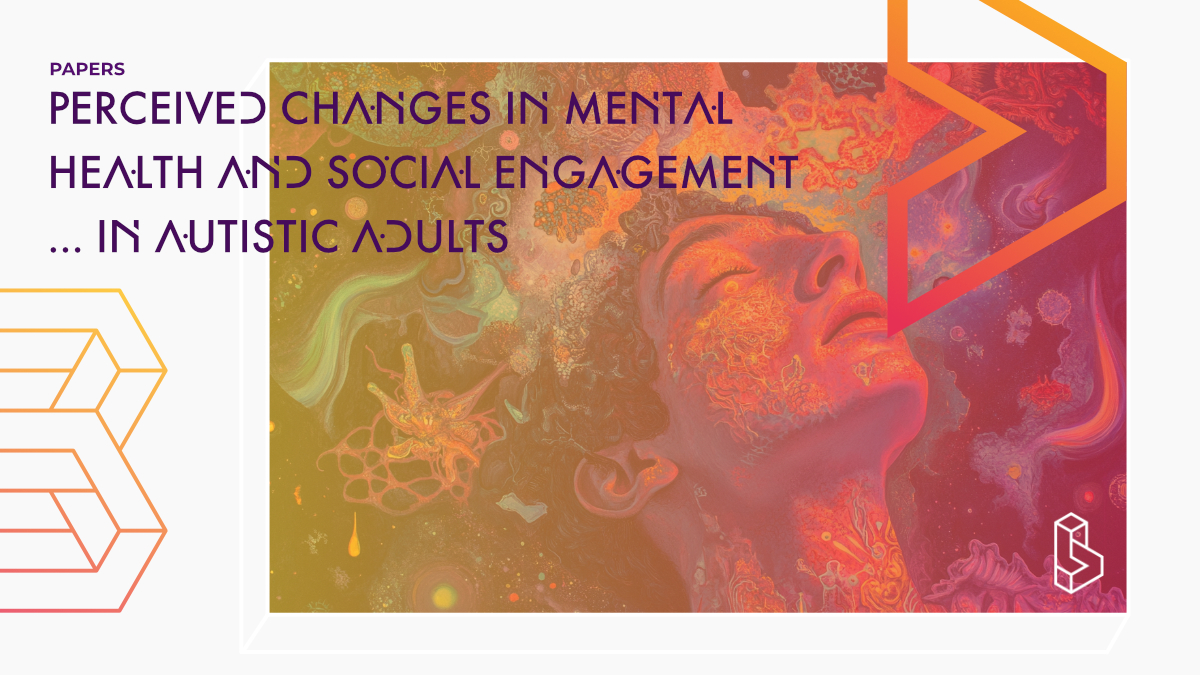This online survey (n=233) of autistic participants with high autism quotient scores examines their experiences with psychedelic drugs and perceived changes attributed to their most ‘impactful’ psychedelic experience. It finds that the majority of participants reported reductions in psychological distress (82%) and social anxiety (78%), and increases in social engagement (70%), while 20% reported undesirable effects such as increased anxiety.
Abstract of Perceived changes in mental health and social engagement attributed to a single psychedelic experience in autistic adults
“Rationale Anecdotal reports suggest that psychedelic drugs can improve psychological wellbeing and social engagement in autistic people. However, there are few contemporary studies on this topic.
Objectives To examine autistic participants’ experiences with psychedelic drugs and the extent to which they attributed changes in mental health and social engagement to their most ‘impactful’ psychedelic experience. We also explored associations between these changes and mechanistically important variables (e.g., aspects of the acute psychedelic experience and changes in ‘psychological flexibility’).
Methods Self-selecting autistic participants (n=233) with high autism quotient scores completed an online survey relating to their most impactful psychedelic experience. Questionnaires assessed the acute psychedelic experience and perceived psychedelic-induced changes in distress, social engagement and psychological flexibility, among other relevant variables.
Results The majority of participants attributed reductions in psychological distress (82%) and social anxiety (78%) and increases in social engagement (70%) to their most ‘impactful’ psychedelic experience. A substantial minority (20%) also reported undesirable effects such as increases in anxiety with some describing their psychedelic experience as among the most negatively impactful experiences of their lives. The only substantial predictor of reductions in psychological distress was increased psychological flexibility.
Conclusion Autistic people attributed changes in mental health and social engagement to a single highly impactful psychedelic experience. The results and their implications are discussed with caution considering the use of a non-experimental design and biased sampling.”
Authors: Jack Stroud, Charlotte Rice, Aaron Orsini, Marco Schlosser, Justine Lee, Will Mandy & Sunjeev K. Kamboj
Summary of Perceived changes in mental health and social engagement attributed to a single psychedelic experience in autistic adults
Autism spectrum disorder, henceforth referred to as ‘autism’, is a developmental condition characterised by restricted or repetitive patterns of behaviour and difficulties in social communication and interaction. Autistic individuals often experience higher rates of mental health problems, suicidality, and lower quality of life compared to the general population. Many autistic people also struggle with loneliness and social isolation, which are associated with worse quality of life outcomes. Research into managing social and emotional issues has been identified as a high priority within the autistic community.
In recent years, classic psychedelics (5-HT2AR agonists such as lysergic acid diethylamide, dimethyltryptamine, etc.) and related drugs (especially MDMA and ketamine) have been proposed as potentially transformational therapies for addressing mental health problems. Recent clinical trials have highlighted the rapidity and enduring nature of the therapeutic effects, as well as the relative safety of psychedelic treatments. However, studies specifically examining the effects of psychedelics, and in particular, their therapeutic potential in autistic individuals, are lacking.
Psychedelics are theorised to induce “pivotal mental states” – short-term windows of cortical hyper-plasticity. These states allow for the relaxation or revision of deeply held higher-order beliefs that are otherwise resistant to change in normal waking consciousness. The 5-HT2A receptor has been proposed as underlying an emotion-releasing pathway, allowing a process analogous to annealing in metallurgy, whereby emotional ‘heat’ allows malleability of previously rigidly held beliefs.
Method
Participants
Find this paper
https://doi.org/10.1007/s00213-024-06685-8
Paywall | Google Scholar | Backup | 🕊
Cite this paper (APA)
Stroud, J., Rice, C., Orsini, A., Schlosser, M., Lee, J., Mandy, W., & Kamboj, S. K. (2024). Perceived changes in mental health and social engagement attributed to a single psychedelic experience in autistic adults: Results from an online survey. Psychopharmacology (Berl). Advance online publication. https://doi.org/10.1007/s00213-024-06685-8
Study details
Compounds studied
LSD
Psilocybin
Topics studied
Autism
Study characteristics
Survey
Participants
233
Humans

